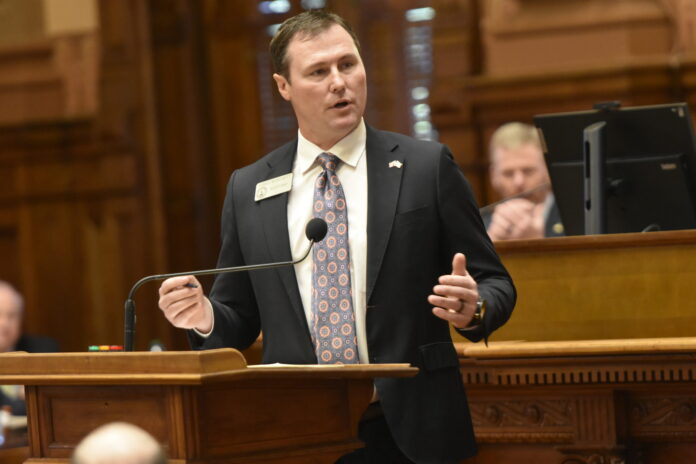
ATLANTA (Georgia Recorder) — A sequel to Georgia Gov. Brian Kemp’s push to overhaul Georgia’s civil litigation system has passed the House in a 98-69 vote, bringing the governor’s top legislative priority closer to fruition.
Unlike its far-reaching counterpart, Senate Bill 69 focuses solely on promoting greater transparency into third-party groups that finance civil suits, which supporters argue could give both judges and juries a clearer sense of what forces might be influencing a case before deciding whether to award damages.
The bill was amended in the House Subcommittee of Rules on Lawsuit Reform to include a new section allowing the Department of Banking and Finance to deny litigation financing registrations and outlining an appeals process for organizations that have been denied. It also clarifies prior language defining foreign adversaries and requires additional disclosures for any stakeholders who own 10% or more of a company financing litigation.
Because of the additional provisions added on the House side, SB 69 will need to return to the Senate for another vote to reconcile changes before it can advance to the governor’s desk, but is not expected to encounter any additional hurdles. The bill has enjoyed more bipartisan support than Senate Bill 68, passing unanimously during its first vote in the Senate.
The use of third-party lawsuit funding is a multibillion dollar industry, according to the U.S. Chamber of Commerce. It works by allowing hedge funds and other investment groups to finance lawsuits in exchange for a portion of anticipated damages awarded to the plaintiffs. Supporters of the practice, which is sometimes referred to as champerty, argue that it can expand access for plaintiffs, who may be struggling financially in the wake of an accident that leaves them unable to work or results in hefty medical bills.
However, critics say that it allows private equity groups to exert influence over trials, which could prolong costly litigation expenses, and may give foreign actors access to sensitive information they would not otherwise be able to obtain. Georgia law doesn’t currently require plaintiffs to disclose the use of outside funding.
“Currently there are no provisions whatsoever that outline regulations on litigation financing,” said House Majority Caucus Whip James Burchett, a Waycross Republican who sponsored the bill in the House. “What this bill seeks to do is put some guard rails and regulation on the industry.”
Efforts to require greater transparency for third-party lawsuit financing have become increasingly popular in state legislatures across the country in recent years, with Indiana, Louisiana and West Virginia all passing new restrictions against the practice in 2024. Georgia lawmakers also said the legislation will help safeguard business innovation to support growth in the state’s economy.
“We have to be thinking of different ways to get more innovation into our economy and our industries,” said Rep. Todd Jones, a South Forsyth Republican who chairs the House Technology and Infrastructure Innovation Committee. “One of the ways that we protect innovation is to ensure that bad actors don’t capture trade secrets, patents and other intellectual property through bad actors and the litigation process.”
As with the first part of Kemp’s tort overhaul legislation, the majority of House Democrats opposed the bill, though Rep. Michelle Au of Johns Creek, Rep. Tangie Herring of Macon and Rep. Brian Prince of Augusta crossed party lines to vote in favor of the legislation. Rep. Charlice Byrd of Woodstock was the sole Republican “no” vote.
Minority Caucus Chair Tanya Miller, an Atlanta Democrat who served on the House Subcommittee of Rules on Lawsuit Reform where the bill was heard, condemned SB 69’s passage, calling Kemp’s push to overhaul Georgia’s civil courts a “manufactured crisis.”
“Like so many Republican-backed bills, it attempts to solve a problem that simply doesn’t exist,” she said of SB 69. “In committee, not a single case in Georgia was identified to justify this legislation. That’s because the need for this bill was never grounded in facts—it’s part of a broader propaganda playbook designed to protect big business and the insurance industry at the expense of everyday Georgians.”







